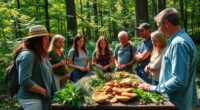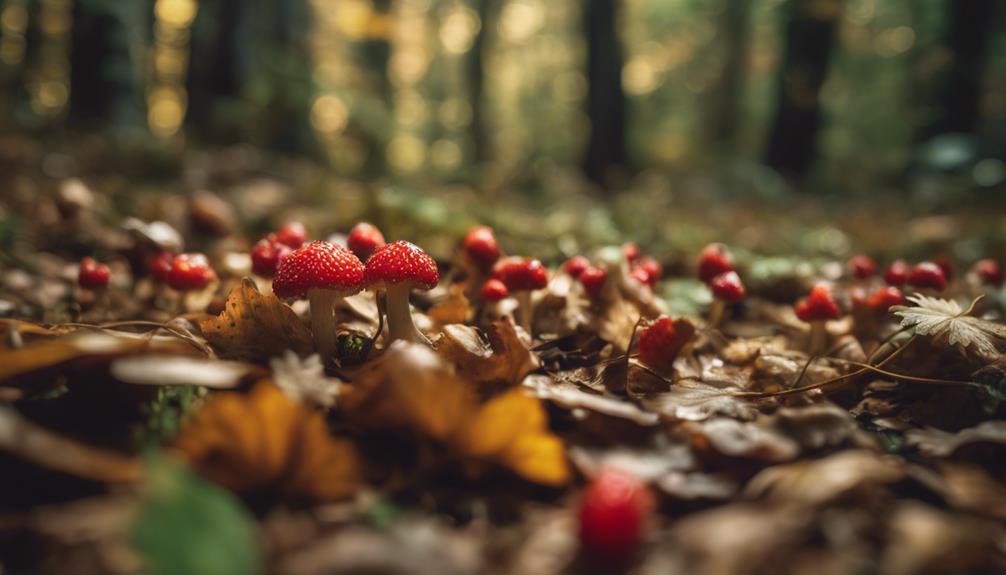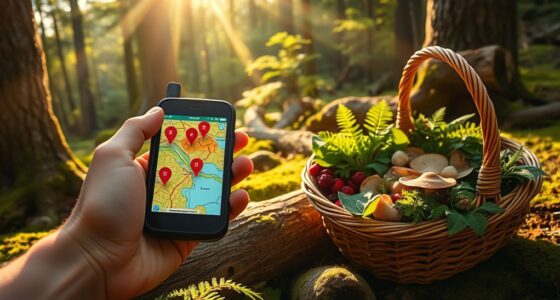When asking landowners for foraging permission, approach them politely and clearly explain your intentions. Mention what you plan to harvest, how much, and why you’re interested. Show respect for their property and ask about any specific rules or areas to avoid. Be prepared for possible hesitations and accept their decision graciously. Building trust and demonstrating responsibility helps. If you’d like to learn how to handle different situations and build good relationships, keep exploring these tips.
Key Takeaways
- Approach landowners respectfully, introduce yourself, and explain your interest in foraging on their land.
- Clearly state what you plan to harvest, how much, and your purpose.
- Ask for permission directly, and be prepared to follow any conditions or restrictions they specify.
- Show awareness of land regulations and respect their property rights to build trust.
- Thank landowners sincerely, and consider sharing part of your harvest as gratitude.

When you’re looking to forage on someone else’s land, asking for permission can make all the difference. Approaching landowners respectfully shows that you value their property and understand the importance of their rights. Before you even ask, it’s helpful to familiarize yourself with any local harvesting regulations. These rules outline what you can and cannot harvest, whether it’s berries, nuts, mushrooms, or other wild foods. Knowing these details demonstrates your seriousness and respect for legal boundaries, which can make landowners more receptive to your request. Remember, landowner rights are fundamental; they control access to their property and have the authority to grant or deny permission. Respecting these rights is essential to building trust and ensuring future foraging opportunities.
When you approach a landowner, be clear about your intentions. Explain what you’d like to harvest, how much you plan to take, and why you’re interested in their land. Being transparent shows you’re responsible and considerate. It’s also a good idea to ask about any specific land rules they might have, such as staying on designated paths or avoiding certain areas. This shows you respect their property boundaries and are mindful of their concerns. If they’re hesitant, don’t take it personally; some landowners are cautious because of liability issues, previous negative experiences, or simply a desire to keep their land private. Additionally, understanding landowner rights can help you approach the situation more confidently and ethically.
Offer to follow any conditions they set and ask if there are particular times that work best for visiting. If they agree, it’s courteous to thank them sincerely and perhaps even offer to share some of your harvest as a gesture of appreciation. If they decline, accept their decision graciously. Not everyone is comfortable sharing their land, and respecting their choice helps maintain good relations. Keep in mind that building a positive reputation with landowners can open doors for future foraging opportunities. Always remember that their land is their property, and respecting landowner rights is not only legally necessary but also the ethical approach to foraging.
Frequently Asked Questions
What Should I Do if Landowners Refuse Permission?
If landowners refuse permission, respect their decision and avoid pushing further. Use negotiation strategies to understand their concerns and see if there’s room for compromise, like limited access or specific dates. Be mindful of cultural sensitivities, as they influence decisions about land use. Maintaining polite, respectful communication can help build trust, and sometimes, demonstrating your good intentions might open opportunities for future permission.
How Early Should I Ask for Permission?
Think of asking for permission as planting a seed; the earlier you ask, the more your chances bloom. Ideally, approach landowners during the early seasonal timing, like spring’s gentle dawn, when they’re more receptive and planning is fresh. Timing considerations matter—reach out well before foraging season peaks, giving them time to contemplate. This proactive approach fosters trust and increases your chances of securing permission before the land becomes busy.
Are There Specific Seasons When Permission Is More Likely Granted?
Permission likelihood tends to be higher during off-peak seasons when landowners aren’t as busy, such as late winter or early spring. Seasonal timing plays a significant role, so avoid asking during busy harvest times or summer months. By approaching landowners when they’re less occupied, you improve your chances of getting permission, showing respect for their land and increasing your success in foraging.
Can I Ask Multiple Landowners for the Same Area?
You can ask multiple landowners for permission, but it’s like juggling balls—you need to coordinate carefully. Reach out to each landowner individually, explain your intentions clearly, and respect their decisions. Keep track of who grants permission to avoid conflicts or misunderstandings. Open communication is key to smooth permission coordination, ensuring you respect property rights and maintain good relationships with all landowners involved.
What Legal Rights Do Landowners Have Over Foraging?
Landowners have legal rights over foraging on their property, guided by foraging laws that vary by location. You can’t forage without permission if laws restrict or require permits, and landowner rights typically include controlling access and harvest. Always check local regulations to understand your rights and restrictions. Respect landowner rights by seeking permission beforehand, ensuring you’re within legal boundaries, and minimizing impact on the environment.
Conclusion
So, next time you’re politely asking a landowner for permission, remember: the real treasure isn’t just the foraging spot, but the trust you build along the way. Ironically, the easiest way to access nature’s bounty is often by simply asking—no secret tricks needed. So go ahead, knock on that door or send that message. Who knew that respecting boundaries could open the door to the wildest foraging adventures?










